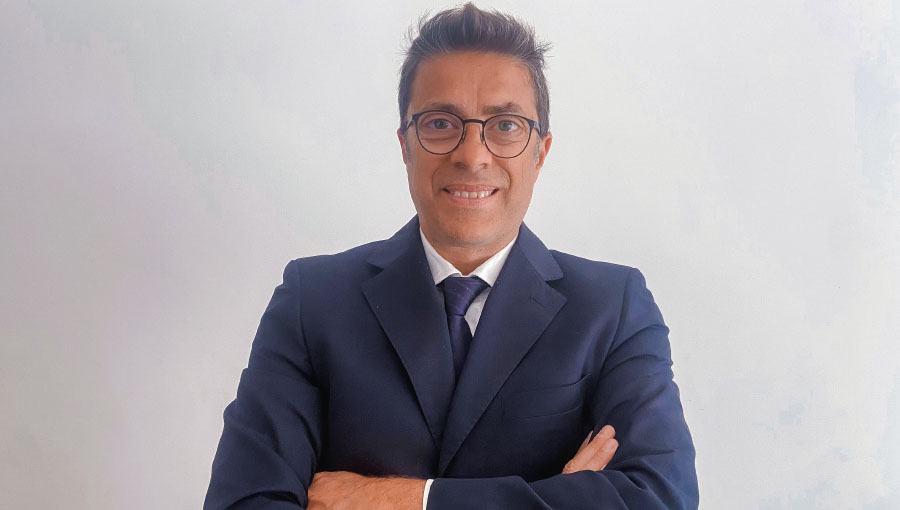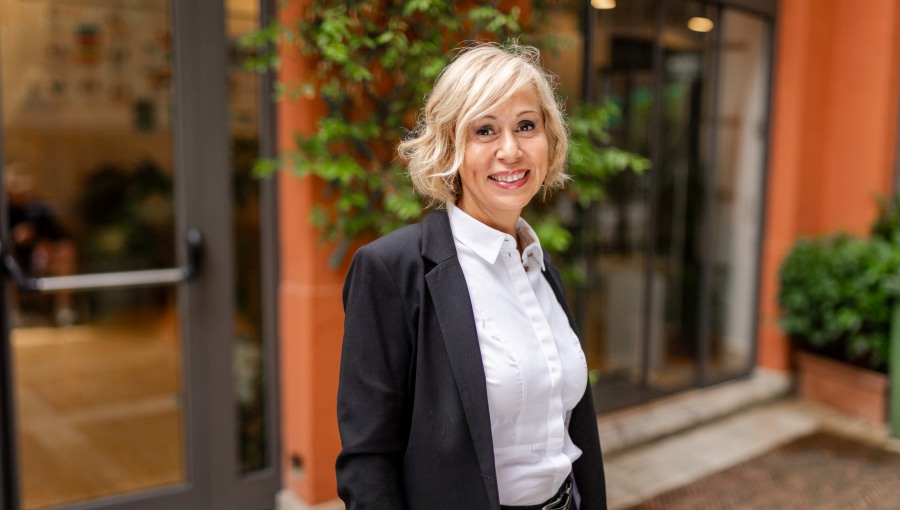Rethinking the Notion of Italy: Professor Federica Capoferri
Born in Brescia, Italy, Federica Capoferri is Associate Professor of Italian Language and Literature at JCU. After finishing her laurea degree at the University of Parma, she completed an M.A. in Italian at the University of Virginia and went on to earn an M.Phil. and a Ph.D. in Italian at Columbia University. Her research interests include modern and postmodern Italian literature, critical and theoretical intersections between literature and cinema, and cinematic screenplays as a literary genre. Her latest publication is La Roma di Mamma Roma (Palombi). The book is an in-depth analysis of Pier Paolo Pasolini’s second movie, Mamma Roma (1962) and a wider discussion of Pasolini’s cinematic and literary art in the early sixties.

Professor Federica Capoferri
What brought you to John Cabot?
When I began teaching at JCU in 2005 it seemed to me that my long, erratic dedication to the study of Italian literature and culture had found its haven. An American University located in Rome, Italy, represented for me the perfect combination of my twofold educational and biographical experiences, the Italian and the American.
What made you decide to go study in the United States after completing your undergraduate degree?
Some university peers were pursuing an M.A.at the University of Virginia, so I applied there and was accepted in the Department of Spanish, Italian, and Portuguese with a fellowship as teaching assistant of Italian language. During my years at UVA, along with learning how to teach my language to foreigners, I began an intensive study of cinema and particularly Italian cinema by taking courses, attending conferences and burying myself in the library for endless screening sessions. I began to explore the various intersections between Italian literature and cinema and I wrote my M.A. thesis on the 1976 cinematic adaptation by director Valerio Zurlini of Dino Buzzati’s novel Il deserto dei Tartari (The Tartar Steppe).
The last chapter of my university education was at Columbia University in New York City, where I had the opportunity to develop my critical tools in literary criticism as well as to further nurture my interest in the relationships between literature and cinema. My doctoral dissertation was about cinematic screenplays written by Italian literary writers, a topic that I continued to explore in my first years at JCU while working on my book, I romanzi in vetrina dal barbiere. Le scritture alla prova del film, published in 2008. After my Ph.D., I moved back to Italy, and namely to Rome, in the hopes of finding a way to apply and share what I had learned about Italian literature and cinema.
According to Machiavelli, successful moves depend half on virtù and half on fortuna (to be precise, a little more on the latter). Thanks to good fortune and I hope, also in part to virtue, I found the job I was trained for and was dreaming of, first at Saint Mary’s College in Rome and then at JCU, where I became full time in 2007.
You recently published a book on Mamma Roma, a 1962 film by Pier Paolo Pasolini. What is the significance of Pasolini today?
In my opinion, it is unquestionable that Pasolini was the most important Italian intellectual of the second half of the 20th century, no matter how much we agree with his vision. At the same time, his vast and multifaceted artistic activity represents one of the most articulate and stimulating experiences of Italian modernity. I do not think it is possible to explore the social, economic, and obviously cultural transformations of Italy in the postwar period and during the Economic Miracle of the 1960s without considering his work as a poet, novelist, filmmaker, and of course as an intellectual who was strongly engaged in the public and political life of the time.
Paradoxically, after decades of moralistic dismissal, Pasolini today is too easily indicated as an ideal companion by opposing cultural and artistic factions. This sort of “canonization,” in my view, risks neutralizing the dialectical quality of his works, their antagonistic premises and conclusions. Pasolini’s legacy, in other words, should be handled with great care but there is no doubt that it must be handled, in one way or another, by all of us.
What are some of the most important lessons a student should take away from your Roots of Italian Identities course?
As the name suggests, this course aims at analyzing a plurality of concepts that lie behind the notion of Italy. By exploring the evolution of some enduring issues such as the question of language, political and geographical unity, and the role of intellectuals in forging the notion of Italy, the course provides students with a variety of tools to understand today’s Italy through the lens of its cultural history. By comparing different periods of Italian literature and looking at various media such as cinema, opera, popular music, and comics, the class challenges students to a critical rethinking of what they were taught to think of as Italian and – in these days even more important – as not Italian. A core course for Italian Studies majors, this class could also be very stimulating for students from other majors who would like to deepen their understanding of Italy and its cultural history. Italian students can also benefit from the course, since it gives them the opportunity to view familiar issues under a different perspective and in a multicultural context.
What can you tell us about the recent screening of Il Principe di Ostia Bronx at JCU? How did you get involved in the project?
I had the pleasure of meeting director Raffaele Passerini thanks to JCU alumnus Giosuè Prezioso, who suggested my name to him for a series of seminars at the Roma Film Academy. When I watched the movie the first time, I immediately thought it would be a perfect documentary to show to the JCU community. Students had the opportunity to learn about locations and characters that belong to a little-known Rome and to enjoy a truly genuine representation of an alternative fulfillment of personal aspirations, qualities, and dreams.
What is your teaching philosophy?
As I think most of my colleagues would agree, teaching and learning are two sides of the same coin. The value of the coin derives from the mutual capacity of professors and students to construct a dialogue. I am very open to my students’ comments and observations. At the end of the day, what I would like to convey to my students (who often complain about the amount of reading in my classes) is the combination of pleasure and professionalism that has inspired my educational path and still informs my research.
What are you currently working on?
Along with La Roma di Mamma Roma, I recently published an essay on Fellini’s Roma and one on the representation of the Tiber river in Italian cinema. Right now, I am brainstorming about different projects, including a book on the representation of Rome in recent Italian cinema.
What is your answer to those who question the validity of studying foreign languages and literature today?
As we all know, this is not the best moment for foreign language (ancient and modern) and literature studies. I obviously understand the importance of job market demands as well as the necessity for our students to develop skills in line with the globalized world and the digital era. I think, however, that humanistic disciplines still have a lot to teach the younger generations, not only in terms of critical thinking but also scientific analysis. The two Italian mathematicians who won the Fields and the Poncaré awards respectively in 2018, both emphasized the importance of their classical background in forging their thinking. Perhaps it was just a coincidence but it is certainly worth thinking about.





